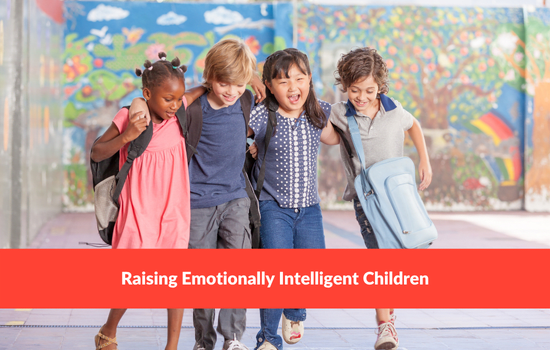Children are our future, so giving them a strong emotional foundation is one of the best investments we can make. Teaching them emotional intelligence anchored in mindfulness, metacognition, emotional regulation, prosocial behaviour, and neuroplasticity, opens doors to resilience, deeper relationships, and lifelong growth.
The Importance of Raising Children with Emotional Intelligence
How Do We Prepare Our Children to Thrive in Today's World?

As parents, we often focus on academic success, but thriving in a complex, fast-paced world demands something more: emotional literacy. In fact, emotional intelligence is a learned skill, not merely an innate trait and when we consciously cultivate it in children, we help them respond adaptively rather than react impulsively.
Many caregivers expect schools to "teach everything," yet most curricula don't prioritize emotional skills. That's why emotional intelligence coaching from caregivers is so vital: to embed self-awareness, regulation, and empathy into everyday life.
While IQ and cognitive skills are essential, children also need social and emotional competence to navigate friendships, digital challenges, and mental health stressors nowadays. Coaching children through emotionally charged moments helps them build metacognition (thinking about their thinking), practice emotional regulation, and develop prosocial behaviour when conflict arises.
Why Science Supports Emotional Intelligence
In recent years, large-scale meta-analyses of social-emotional learning (SEL) programs have reinforced their positive influence. A 2023 review of 424 experimental SEL studies across more than 50 countries found that children receiving SEL instruction demonstrated gains in academic achievement, improved social behaviours, and enhanced well-being, even six months after the intervention concluded. (Source: Yale School of Medicine)
Moreover, SEL programs implemented with high fidelity (sequenced, explicit, taught by trained adults) had stronger effects, especially when led by regular classroom teachers rather than outside facilitators.
In terms of emotional regulation and mental health, social and emotional learning frameworks have been linked to reductions in anxiety, depression, and emotional distress in youth. (Source: KFF)
Cutting-edge research is also exploring how neuroplasticity supports emotional growth: the brain's wiring can change through repeated practice of self-awareness, empathy, and emotional regulation. Some new tools even blend AI and media to scaffold emotional reflection: for instance, eaSEL, an AI system, helps parents prompt conversations based on emotional moments in children's video content, deepening emotional insight. (Source: Cornell University arXiv)
Key Principles for Raising Emotionally Intelligent Children
-
Model emotional regulation and metacognitive awareness: Narrate your own thought-emotion cycles: "I'm feeling frustrated, let me breathe and think what's behind that." This not only shows emotional regulation in action, but also invites metacognition in your child.
-
Turn emotional moments into coaching opportunities: When your child is upset, pause with them and say, "I notice your face is red—what's happening inside right now?" Use mindfulness or breathing to slow the moment, then reflect: "What could you try next time?"
-
Build emotional vocabulary and prosocial behaviour: Help children name subtler emotions (e.g., "irritated," "disappointed," "embarrassed") and discuss how others might feel in response. Encourage perspective-taking: "How might your friend feel when that happens?"
-
Set consistent, gentle boundaries and scaffold self-regulation: Offer a calm structure (using timers and routines) while allowing autonomy. Gradually hand over regulation strategies (like deep breathing or counting) so children internalize them.
-
Use media and technology as allies (not opponents):
-
Tools like eaSEL show how digital consumption can become emotional reflection rather than passive screen time.
-
At the same time, be cautious: recent research suggests that excessive screen or gaming time may be linked to social-emotional problems in children, especially when screens become a means of emotional escape. (Source: People.com)
-
-
Reinforce emotional growth through consistency, practice, and journaling: Encourage children to keep emotion journals (thought → feeling → strategy) or reflect daily on one empathy moment. Over time, this repetition supports neuroplasticity and strengthens emotional circuits.
-
Collaborate with schools using evidence-based SEL: Advocate for or support the adoption of high-quality SEL programs in schools, such as those aligned with CASEL's framework. SEL programs are associated with academic gains (on average, +11 percentile points) and improved social-emotional outcomes.
The Lasting Gift of Emotional Intelligence
Raising emotionally intelligent children is more than a parenting goal, it's an investment in their resilience, relationships, and lifelong flourishing. By weaving mindfulness, metacognition, emotional regulation, prosocial behaviour, and neuroplasticity into everyday interactions, caregivers become powerful emotional architects of their child's future.
When you guide your child to notice, name, navigate, and nurture their feelings, you're gifting them not just coping skills for today, but the foundations of emotional maturity, social connection, and adaptability. Emotional intelligence isn't a luxury—it's their greatest advantage.
For readers interested in exploring emotional development and mindset further, consider the chapter "Raising Emotionally Intelligent Children" in my book, The Power of Emotion. We offer customized Emotional Intelligence training both in-person and online. If you are interested in these services, contact us today!
This article was originally published on May 20, 2017, and has been updated (October 2025).
More Motivational Reads Here »
How Emotionally Intelligent Are You?
Sign up for Linda's monthly tips to build your Emotional Intelligence and reduce Emotional Hijacking!

















